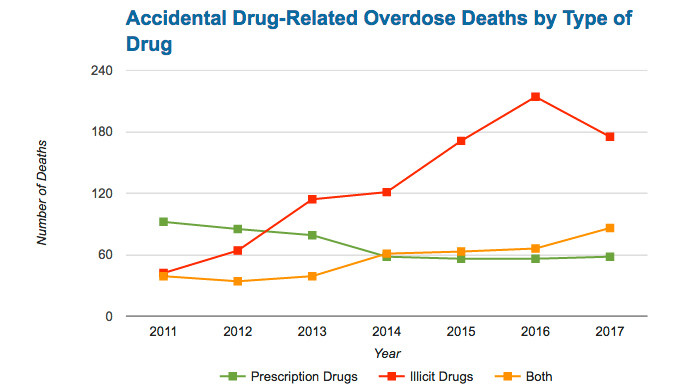Confirmed drug OD deaths dropped by 4 percent in 2017
Task Force moves ahead with its “communities coming together” approach
PROVIDENCE – The data for the official number of confirmed accidental overdose deaths in 2017 in Rhode Island has been finalized: there were 323 overdose deaths last year, a slight 4 percent decrease from 336 overdose deaths in 2016, according to the R.I. Department of Health statistics scheduled to be released on Monday morning, April 9.
At the same time, there was an increase in the number of accidental overdose deaths involving fentanyl, with a 5 percent increase in 2017, compared to 2016, rising from 195 to 205, demonstrating the perverse manner in which fentanyl has changed the dimensions of the overdose epidemic.
What stood out in reviewing the monthly analysis for 2017 posted on the Prevent Overdose Rhode Island website was the fact that the lowest number of accidental overdose deaths occurred in May of 2017 – with just 17 overdose deaths, and only 10 of those related to the use of fentanyl, which was also the lowest number of fentanyl-related deaths recorded last year.
Translated, the decrease of 13 deaths between the total number of accidental overdose deaths in 2016 and 2017 appeared to match the difference between the monthly totals for May of 2016, at 31 deaths, and May of 2017, at 17 deaths – a difference of 14 deaths.
In response, from an epidemiological perspective, questions to be asked might include: What happened in May of 2017 to result in a lower accidental overdose total? Were there more doses of naloxone distributed or handed out in May of 2017? Was there an increase in the demand of peer recovery coaches at hospital emergency rooms in May of 2017? Were more people enrolled in the state’s centers of excellence?
In looking at the numbers, Dr. Nicole Alexander-Scott, the director of the R.I. Department of Health, told ConvergenceRI that she had made the exact same note to herself after examining the data: to try and better understand what had occurred during May of 2017 to figure out why there had been a decrease in the amount of accidental overdose deaths. Alexander-Scott also said she planned to delve deeper into an analysis of potential reasons for the decrease.
What the doctor said
In advance of the release of the official confirmed data of the number of accidental overdose deaths in Rhode Island, ConvergenceRI spoke briefly with Dr. Nicole Alexander-Scott, the director of the R.I. Department of Health
Here is the ConvergenceRI interview with Dr. Alexander-Scott, talking about what kinds of conclusions that might be drawn from the data.
ConvergenceRI: Is there a better metric to use than deaths when measuring the impact of the overdose epidemic in Rhode Island?
ALEXANDER-SCOTT: There are a number of ways we can determine how we are saving lives. That is the ultimate goal. Tracking naloxone distribution and the outcomes is one way.
Another way is determining the monthly average of people receiving medication-assisted treatment.
A third is analyzing the 48-hour reporting system from hospital emergency departments, tracking suspected overdoses, non-fatal overdoses and fatal ones.
We can also determine new client enrollment in peer recovery coaching.
[A study that compared the first six months of medication assisted treatment at the state’s correctional facilities, compared to the previous six months before the program was implemented, found that there was more than a 60 percent reduction in overdose deaths.]
ConvergenceRI: With the continued rise in the number of overdose deaths involving fentanyl, does the data seem to point toward the importance of launching a harm reduction initiative to distribute fentanyl-testing strips in Rhode Island.
ALEXANDER-SCOTT: The data definitely supports exploring that option. Our goal is really about saving lives. We will be exploring harm reduction strategies, with fentanyl testing strips being one of them.
ConvergenceRI: Is that something that could be accomplished sooner rather than later. What are the potential roadblocks? Could a health equity zone take that on, if it was determined to be a community priority?
ALEXANDER-SCOTT: Our work on establishing such a harm reduction strategy will begin with law enforcement, getting buy-in and engagement, working in coordination with R.I. State Police Captain Matthew Moynihan, who has really taken the lead on law enforcement for the Task Force. He has been fantastic.
We need to engage with law enforcement, to have discussions about it, and identify the challenges as well as some of the first steps. This is a complex issue.
ConvergenceRI: In a recent blog post, you quoted Jonathan Goyer and his remarks in his conversation with the U.S. Surgeon General, saying that the opposite of addiction was not sobriety but connectedness. Moving forward, how will the Governor’s Task Force on Overdose Prevention and Intervention respond to that observation?
ALEXANDER-SCOTT: The 2018 Task Force theme is “communities coming together.” We recognized that we have implemented [interventions] at the state level. The key is now to be able to bring those strategies to the local level, to the communities, to meet people where they are, to provide that kind of tailored implementation.
Tom Coderre, Gov. Raimondo’s new senior policy advisor, has really been a leader on this effort, to engage more and to connect better with local communities, and to support place-based strategies.
[Editor’s note: Several of the health equity zones in Rhode Island have developed action plans which include responses to the overdose epidemic as part of their community-led needs assessment, according to agency spokesman Joseph Wendelken. They include:
• The West Warwick and Woonsocket health equity zones both have overdose prevention work groups and participate on the Task Force.
• The Woonsocket health equity zone funds a drop-in peer recovery center.
• West Warwick has posted a behavioral health navigator within the police department, and also received a mini-grant for overdose prevention.
• The Bristol health equity zone also recently opened a drop-in recovery center in Bristol to provide prevention, wellness, and recovery support services.]






